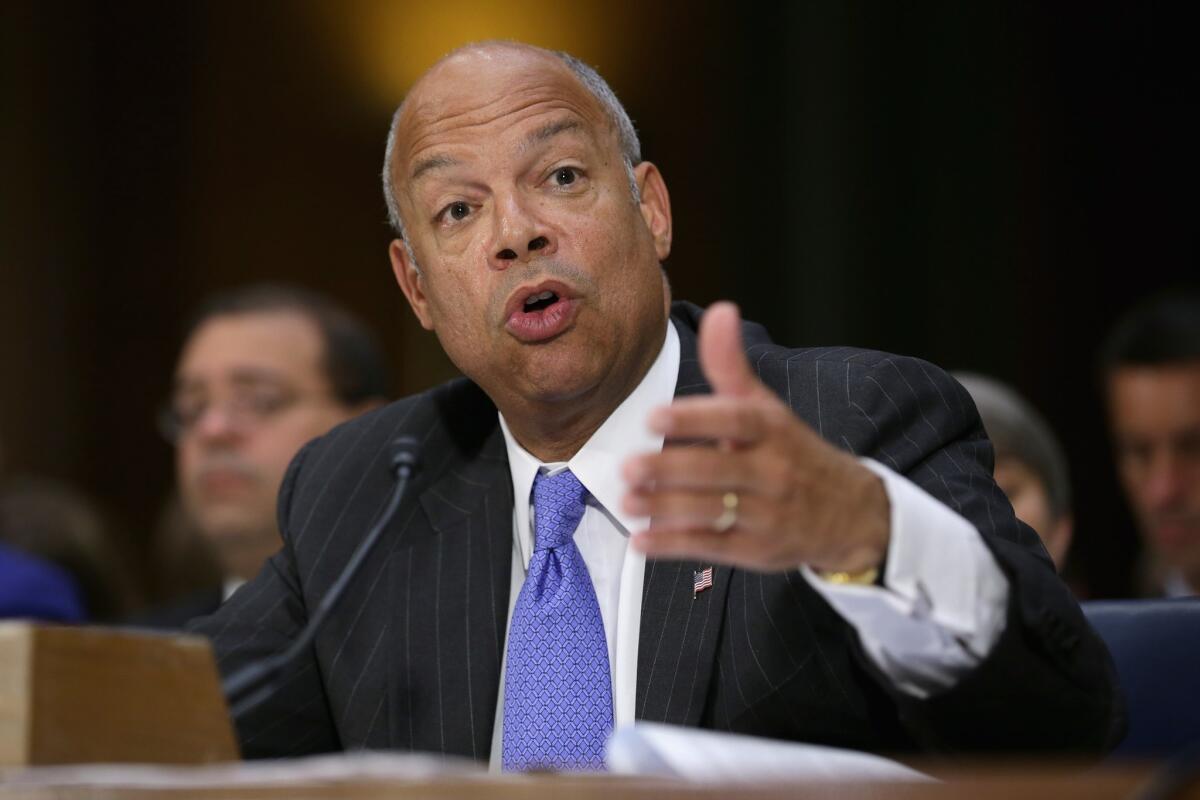U.S. border crisis is draining the immigration budget

- Share via
Reporting from Washington — Immigration officials and Border Patrol agents will run out of money if Congress doesn’t approve emergency funds to deal with the flood of young migrants at the southwest border, Department of Homeland Security Secretary Jeh Johnson told senators Thursday.
At the same time, Sen. Dianne Feinstein (D-Calif.) urged Johnson to use a provision of a 2008 law that gives the government flexibility in how to handle children at the border in “exceptional circumstances.”
The arrival at the border of tens of thousands of children and teenagers over the last few months has created a political crisis for the administration, which officials have scrambled to contain.
The crisis has sapped the budget, driving up overtime, detention and transportation costs, Johnson told the Senate Appropriations Committee.
Congress is considering President Obama’s $3.7-billion request to handle the crisis. If it is not approved, other border security fuctions will have to be cut, Johnson said, describing significant budget problems at the department’s Immigration and Customs Enforcement and Customs and Border Protection agencies.
“At the current burn rate, ICE is going to run out of money at mid-August and we project CBP will run out of money in mid-September,” Johnson said.
If Congress doesn’t approve new funds, “we will have to go to a harsh form of reprogramming that will take money away from some vital homeland security programs I am sure members of this committee care a lot about,” he said.
Of the $3.7 billion requested, about half, or $1.8 billion, would go to the Department of Health and Human Services to cover the cost of caring for children who are in removal proceedings.
About $1.1 billion would go to Immigration and Customs Enforcement and $433 million would go to Customs and Border Protection, which manages the Border Patrol. The balance would fund an increase in the number of immigration judges and go to State Department programs for Central America that aim to stop families from sending their children to the United States.
More than 57,000 unaccompanied children have been apprehended at the southwest border since October and 90,000 are expected to arrive by the end of the year. Thousands of children and families with children are being held at makeshift shelters in Border Patrol stations and military bases in the U.S.
Lawmakers of both parties were concerned that the cost would continue to go up if the administration can’t find a way to persuade families in Central America to stop sending their children to the U.S.
Sen. Barbara Mikulski (D-Md.), the chair of the committee, said she was concerned about the high cost of caring for children once they get to the U.S. and are placed with social workers by the Department of Health and Human Services.
“We are worried about these children,” Mikulski said, but middle class families in the U.S., “they are worried about their own children.”
“Will this request be the end or will it be the beginning of many new requests for emergency funds?” asked Alabama Sen. Richard Shelby, the top Republican on the committee.
In addition to the funding request, Johnson asked lawmakers to revise a 2008 law that requires the government to provide immigration court hearings for children from countries that do not share a border with the U.S. rather than having border agents return them directly to their home countries.
Those required hearings are delaying deportations of children from Central American countries such as Guatemala, Honduras and El Salvador who make up the largest share of the cross-border surge.
“It would help if the Senate amended the law to treat children the same from a non-contiguous country as a contiguous country,” Johnson said.
Feinstein, however, told Johnson that the “exceptional circumstances” provision in the 2008 law could make an amendment unnecessary. The government could adopt a rule that a certain number of children crossing the border per week or per month would constitute an “exceptional circumstance,” she said.
Broadening the use of such an exception could help immigration authorities more quickly determine which children have a case for special visas or asylum in the U.S. and which should be returned.
“I hope that this exception is enough to give you what you need in terms of added discretion,” Feinstein said. When lawmakers wrote the law, Feinstein said, there were about 5,000 unaccompanied children coming across the border, less than a tenth of the number crossing now.
“I have offered to work with you. I hope the bill does not need to be amended,” she said.
Senate Democrats have balked at changing the 2008 law, saying that the additional screening and court proceedings are needed to be sure the U.S. is not sending children to a country where they already have been victims of sex trafficking or gang-related violence.
Sen. Patrick Leahy (D-Vt.) said he would “fight tooth and nail” against changing the trafficking law.
For more reporting on immigration follow me on Twitter @ByBrianBennett.
More to Read
Sign up for Essential California
The most important California stories and recommendations in your inbox every morning.
You may occasionally receive promotional content from the Los Angeles Times.














